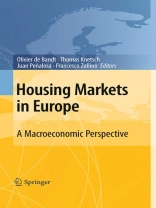During the recession in the years 2008-2009, the most severe for mature economies in the post-war period, housing markets were often mentioned as having a special responsibility. The objective of this book is to shed light on the cyclical behaviour of the housing markets, its fundamental determinants in terms of supply and demand characteristics, and its relationship with the overall business cycle. The co-movements of house prices across countries are also considered, as well as the channel of transmission of house price changes to the rest of the economy. Particular attention is paid to the effects on private consumption, through possible wealth effects. The book is a compilation of original papers produced by economists and researchers from the four main national central banks in the euro area, also with the participation of leading academics.
Tabella dei contenuti
Introductory Lecture.- Housing in DSGE Models: Findings and New Directions.- Housing and the Business Cycles.- Housing and the Macroeconomy: The Italian Case.- Cyclical Relationships Between GDP and Housing Market in France: Facts and Factors at Play.- Does Housing Really Lead the Business Cycle in Spain?.- Housing Cycles in the Major Euro Area Countries.- Common Business and Housing Market Cyles in the Euro Area from a Multivariate Decomposition.- The International Transmission of House Price Shocks.- Macroeconomic Models of Housing.- The ’Housing Bubble’ and Financial Factors: Insights from a Structural Model of the French and Spanish Residential Markets.- Trend and Cycle Features in German Residential Investment Before and After Reunification.- User Costs of Housing when Households Face a Credit Constraint: Evidence for Germany.- Causes and Welfare Consequences of Real Estate Price Appreciation.- Wealth Effects.- Wealth Effects on Private Consumption: the French Case.- An Assessment of Housing and Financial Wealth Effects in Spain: Aggregate Evidence on Durable and Non-durable Consumption.- The Effects of Housing and Financial Wealth on Personal Consumption: Aggregate Evidence for Italian Households.- Housing and Portfolio Choices in France.- Housing, Economic Policy and Financial Stability.- House price Boom/Bust Cycles: Identification Issues and Macro-prudential Implications.- Impact of Fiscal Policy on Residential Investment in France.
Circa l’autore
Olivier de Bandt holds a Ph D in economics from the University of Chicago. He is currently Director of Business Conditions and Macroeconomic Forecasting at the Bank of France. He is also associate professor of economics at the University of Paris Ouest and co-editor with Heinz Herrmann and Giuseppe Parigi of ‘Convergence or Divergence in Europe?’ published by Springer Verlag. Thomas Knetsch holds a Ph D in economics from the Freie Universität Berlin.He currently heads the structural issues unit of the Macroeconomic Analysis and Projections Division in the Economics Department of the Deutsche Bundesbank. He has published a number of research papers in empirical macroeconomics, applied time-series analysis and economic forecasting. Juan Peñalosa has developed his career as an economist in the Economics, Statistics and Research Directorate General of the Bank of Spain, having been member of different European Committees both in Brussels and in Frankfurt linked to monetary, financial and macroeconomic issues. At present he is head of the Forecasting and Conjunctural Analysis Division in the Bank of Spain. Francesco Zollino received a Ph D in economics from the University of Southampton (UK) and was visiting fellow at Princeton University (USA). He is currently Deputy Head of the Economic Outlook Division in the Research and International Relations Area of the Bank of Italy.












